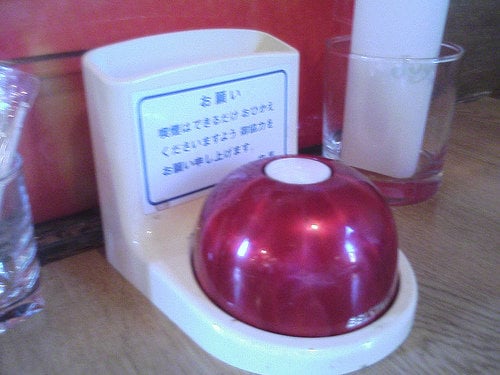Japan is an atoll of more than 3000 large and small islands, with the major ones being the main island of Honshu (HONE-shu, “main province”); the northernmost island of Hokkaido (ho-KAI-doh, “north sea road”); southern Kyushu (KYU-shu, “nine provinces,” since there used to be nine of them in the old days); and tiny Shikoku (shi-KOH-koo, “four countries,” since there were, and still are, four prefectures there). Japan was formed by volcanic activity, and as such, it’s home to more than a few earthquakes — in fact, we’ve managed to feel about five small quakes today while working. Although the land mass of Japan is small — equal to the state of Nebraska — it’s spread out over a wide area, and if you lay Japan over a map of the USA, it easily stretches from sea to shining sea. Whenever there’s a big quake somewhere in Japan, we know we’ll get emails from family members asking if we’re okay, even though the shaking is often hundreds of miles away from us.
I’ve written before about how Japan is a very different place from the U.S. or Europe when it comes to the relationship between men and women. On the one hand, Japan is a male-centric society in which it is joshiki (accepted common sense) that the husband be the “big, black pillar” at the center of the household, and women are more often than not happy with this arrangement. When the famous blue pill for men came along, it was approved for sale in Japan in record time by Japan’s male politicians, while women had to wait 30 years to for the Pill to be legalized here. On the other hand, it’s the women in Japanese families who control the household finances and make sure the various goals of the family are managed properly, and the image of a salaryman husband buttering up his wife for a little more allowance this month is not uncommon at all. My Japanese mother-in-law gave me her own Buddhist-tinged philosophy once, so I’ll pass it along to you here. A woman is the ground, she told me, and a man is the seed planted in the ground. If the ground is firm and strong, the tree will grow tall and provide cover for the ground. Since everything eventually falls on the ground (the rain, the various troubles that happen to us all in life), there’s a fundamental difference between men and women that can never be reconciled, only accepted. It’s a little “zen” for some people, but it was an interesting way of looking at the issue, I thought.
In other news, Japan is in the middle of another debate about the sexes that will determine the future direction of the Imperial Family. The current Emperor is Akihito, known in Japan as the Heisei Emperor since this is his era according to the Japanese way of counting years. His son is Prince Naruhito, and he and his Oxford-educated wife Masako (the “Princess Di” of Japan, if you will) have a daughter, Aiko-sama, whose name happens to translate as “love child.” Because Naruhito’s younger brother Prince Akishino has also fathered two daughters, there are no male heirs to continue the line of the Emperors, which goes back through 125 rulers to the year 660 B.C., according to legend. Prime Minister Koizumi supports the idea of allowing Aiko to become Empress, since there is precedent for this in Japan’s history. Predictably, conservative politicians are against the idea, with one argument being that if Aiko married someone from outside the Imperial Family, the male Y chromosome from the current line would be forever lost, replaced by the Y chromosome of whoever she marries. I hope they find a good solution to the problem.
RSS, if you don’t know, is a very convenient way to read news and other posts on the Internet, from blogs to mainstream news sources. There are many stand-alone RSS readers for all computer platforms, or you can try an online news aggregator like Newsgator (the one I like, since I can read blogs with my phone). If you want to follow J-List’s updates and new product posts with an RSS reader, we’ve posted links to feeds on the left side of the J-List and JBOX.com sites.
Remember that J-List carries a great for fans of JPOP, the iTunes Japan Music Cards, which are the only way to buy music from the iTMS unless you happen to have a credit card registered inside Japan. Looking for the Doraemon theme song? Want to browse the latest singles by Every Little Thing? Or browse the Japan Hip Hop scene for songs you like the sound of? It’s all very easy to do from any Mac or PC running iTunes. The cards come in 2500, 5000 and 10,000 yen denominations, and are super-easy to use — just log out of your current iTunes account, select the Japan store, click the link to enter an iTMS card number, and you can set up a new account for your Japanese music. You don’t even have to muck with Japanese characters in the iTunes application, since it will work in whatever language you have it set to.















